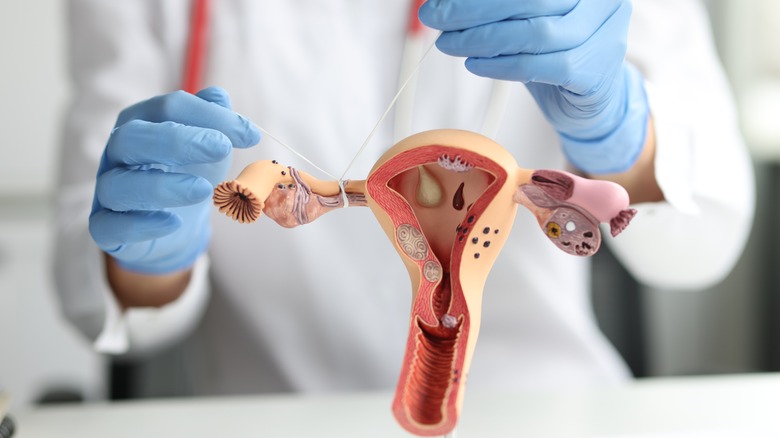What Happens If You Get Pregnant After Getting Your Tubes Tied
For those who are certain they don't want to have children or are done having kids, a good option for permanent birth control is tubal ligation, or having your tubes tied. However, it's not perfectly fail-safe, and in rare cases, pregnancy can still occur (via Mayo Clinic). Here's what you need to know about getting pregnant after having your tubes tied.
In tubal ligation, the fallopian tubes are tied off, cut, or blocked. This stops an egg from passing through the tubes from the ovaries, and also prevents sperm from going up the tubes to meet an egg. It's a short surgical procedure that's sometimes done at the same time as other abdominal surgeries, like a cesarean section. Tubal ligation is an effective form of birth control, but it's not for everyone (via Johns Hopkins Medicine). It's permanent, but if reversing it is attempted, it involves another surgery and might not be effective, as only 50% to 80% of women who have it reversed are able to become pregnant.
While there are risks involved in any kind of surgery, only one in 1,000 women will experience serious problems from tubal ligation. These can include infection, internal bleeding or bleeding from an incision, anesthesia side effects, damage to other organs, and ectopic pregnancy, and these risks increase if you are overweight, have diabetes, or have pelvic inflammatory disorder. There's also a small chance that the procedure could fail, and you could become pregnant.
The risk of pregnancy after tubal ligation
Approximately one in 200 women will get pregnant after tubal ligation, so while rare, pregnancy isn't 100% avoidable (via Medical News Today). This usually happens because of an incorrectly performed procedure, or the tubes eventually growing back together. If you're experiencing pregnancy symptoms after a tubal ligation, a regular at-home pregnancy test will still work; if you get a positive result, consult your doctor.
If pregnancy does occur, it can be dangerous, as your risk of an ectopic pregnancy is increased after tubal ligation. An ectopic pregnancy happens if the fertilized egg implants outside of the uterus, in the fallopian tubes (via Cleveland Clinic). This could cause the fallopian tube to rupture and lead to internal bleeding, so it's considered a medical emergency. Ectopic pregnancy symptoms include vaginal bleeding, pelvic or lower back pain, and dizziness. If it's detected early, medication can be prescribed to stop the pregnancy; if the medication doesn't work, surgery may be necessary.
A 2014 study published in Fertility and Sterility found that risk of ectopic pregnancy after tubal ligation was 2.4 per 1,000 procedures after 10 years, and 2.9 per 1,000 procedures after 15 years. Researchers found that women who had their tubes tied before the age of 28 were 3.5 times more likely to experience an ectopic pregnancy, compared to those who had the procedure done after the age of 33.
If you think you may be experiencing an ectopic pregnancy, seek medical attention immediately.


